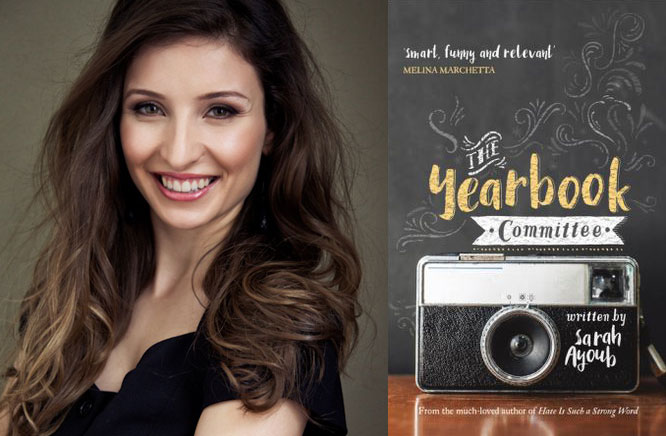National Day of Action Against Bullying and Violence is an annual anti-bullying event that aims to raise awareness of bullying in all of its forms as well as educate families on how to prevent and deal with bullying.
Bullying has always been a hot topic in Australia and as social media continues to flourish so does cyberbullying with research showing that up to 15% of high school students (grades 9-12) have experienced bullying online. With social media now becoming an ingrained part of our society there is a growing concern that the number of Aussie kids being bullied online will continue to rise.
The Yearbook Committee, a new novel by author Sarah Ayoub shows how technology and social media can affect the way people interact with one another, particularly in the school environment.
The story follows five Australian teenagers in their final year of high school and sheds light on the social issues affecting today’s teens like cyberbullying, peer pressure, self-esteem and relationships. Sarah is also the author of Hate Is Such A Strong Word, which also deals with issues such as bullying, racism and hatred.
Here, Sarah reveals the cyberbullying affect on her characters lives and the story behind her stories…
What inspired you to write Hate Is Such a Strong Word?
“I went to a mono-cultural school from Kindergarten to Year 12 so I had a very narrow view of the world until I finished school and got my first job. My first year or two at uni was a little awkward because for the first time in my life, I was around people who didn’t share the same Lebanese Catholic background as myself and the people I went to school with. There was a lot of stereotyping around Australian Lebanese people due to some highly publicised crimes at the time, and I was really struggling with my sense of identity and my place in the world. Writing Hate is such a Strong Word was a way for me to explore my thoughts about racism, belonging and multiculturalism told through the experiences of a 17-year-old girl caught between her parents’ traditional views and ideas about women, and her Australian life and surroundings.”
What have your readers learnt from the book?
“I have had readers from all walks of life write to me to share their thoughts on the book. Some were totally unaware that there were Lebanese/Middle-Eastern Christians, some told me they came from very racist white families and the book reminded them that there are people of ethnic backgrounds who really love and value the Australian way of life the way that it is. Some were glad that I touched on the topic of reverse racism as well. But mostly I get teenage girls writing to share how much they were able to relate to Sophie. They don’t always share her same background or religious tradition, but plenty of them find her coming of age honest and reflective of their life – she’s a simple girl who has the same issues that they battle around their future, their changing friendships, their family life and of course, relationships with the opposite sex. And then there’s the odd woman in her 40s who reads it and tells me she’s glad that her not-so-flash teenage years due to strict parenting were not just unique to her.”
What inspired you to write The Yearbook Committee?
“Year 12 is a year of massive change. As we leave our youth behind and gravitate more to the person we become in our adult lives, there’s a shift in the way we perceive and interact with other people – some we’ve never looked at twice. We start to see beyond the school cliques and associations and learn about the values that determine good people and successful relationships. I wanted to write about how this shift plays out among people of different personalities going through very different experiences of adolescence. I remember getting to year 11 and wondering why the ‘losers’ at the school were the losers. Why did we laugh at this particular boy? Why did we make fun of this girl? The school yard reminds me very much of the Shakespearian quote about the world being a stage and its people as actors, and that’s how school can be, until you actually learn to reflect on your attitudes and conversations and see beyond the school yard personas of your classmates. I guess I just wanted to share a story that had very real characters with very ordinary adolescent issues – nothing too romanticised or out of the ordinary – that could still enlighten them about the behaviours we don’t often think twice about.”
How has cyberbullying shaped the story?
“Cyberbullying ended up taking up more of the story than originally intended, but I guess that’s because you can’t write a tale of real teenagers without incorporating their prolific use – and abuse – of social media within it. The sad thing about cyberbullying is that it can take many forms – it can be direct on a person’s social media channel, but it can also take place on other mediums using that person’s picture or handle or whatever. So it’s very unpredictable and the damage it can do transcends geographical locations – one video that might originally be intended for a group of friends can end up shared thousands of times across the globe, and we don’t always think about that. The cyberbullying aspect of The Yearbook Committee is only prevalent in the storyline of one character, but it has repercussions for others in the book, who as a result of that bullying learn things about their classmates that they might not otherwise have realised. The consequences of bullying are always far-reaching.”
How do your characters deal with cyberbullying?
“There’s a female character in the book who has a psychologist mum, so for her, the cyberbullying storyline is something she feels comfortable discussing with a responsible adult. The others aren’t so lucky – they talk about it with friends who might not understand the gravity of the situation, and battle lines are drawn when in some previously tighter friendships, some want to put an end to it, while others won’t. It sounds very convoluted, but in a school setting the repercussions of bullying reverberate, and the characters are torn between ignoring it so as to not give the bullies any ammo, and fighting back against it without realising if there are consequences for doing this.”
What other issues do the teenagers deal with?
“There are five main characters in the book so there are certainly a few – family pressure, mental illness, issues about gender and stereotype, questions about the future and life after school, and of course, those first intense relationships of our teenage years. The characters all have their own weaknesses, but they’re also very well aware of their true passions. For them, it’s all about balancing the true desires of their heart with their external world and the pressures that come from their friends, teachers, parents and what is deemed appropriate for their age. There’s a lot of arguing, questioning and personal reflection, and ultimately, it is answering to their conscience that determines how their storyline plays out. To an adult, it may not sound very teen, but it’s a book with themes that transcend adolescent boundaries – growth is a part of all our personal stories.

Check out The Yearbook Committee and Hate Is Such A Strong Word by Sarah Ayoub for stockists.
National Day of Action Against Bullying and Violence is on Friday 18th March.






